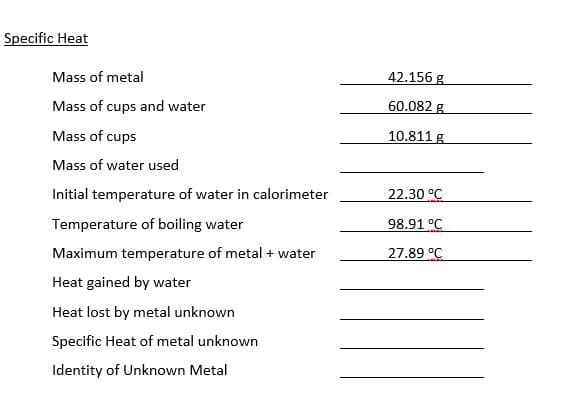Specific Heat Mass of metal 42.156 g Mass of cups and water 60.082 g Mass of cups 10.811 g Mass of water used Initial temperature of water in calorimeter 22.30 °C Temperature of boiling water 98.91 °C Maximum temperature of metal + water 27.89 °C Heat gained by water Heat lost by metal unknown Specific Heat of metal unknown Identity of Unknown Metal
Specific Heat Mass of metal 42.156 g Mass of cups and water 60.082 g Mass of cups 10.811 g Mass of water used Initial temperature of water in calorimeter 22.30 °C Temperature of boiling water 98.91 °C Maximum temperature of metal + water 27.89 °C Heat gained by water Heat lost by metal unknown Specific Heat of metal unknown Identity of Unknown Metal
Principles of Modern Chemistry
8th Edition
ISBN:9781305079113
Author:David W. Oxtoby, H. Pat Gillis, Laurie J. Butler
Publisher:David W. Oxtoby, H. Pat Gillis, Laurie J. Butler
Chapter12: Thermodynamic Processes And Thermochemistry
Section: Chapter Questions
Problem 14P
Related questions
Question
100%
It is assumed that the heat given up by the metal is transferred to the water. The specific heat of water is 4.18 J/g°C, which means that 4.18 Joules of heat energy is required to raise the temperature of 1 gram of water 1 °C. Use the table below to determine which metal your unknown is.
|
Metal |
Specific Heat (J/g°C) |
|
Aluminum |
0.902 |
|
Brass |
0.380 |
|
Copper |
0.385 |
|
Gold |
0.126 |
|
Iron |
0.449 |
|
Nickel |
0.444 |
|
Silver |
0.235 |
Fill out the table below and determine the identity of the unknown metal.

Transcribed Image Text:Specific Heat
Mass of metal
42.156 g
Mass of cups and water
60.082 g
Mass of cups
10.811 g
Mass of water used
Initial temperature of water in calorimeter
22.30 °C
Temperature of boiling water
98.91 °C
Maximum temperature of metal + water
27.89 °C
Heat gained by water
Heat lost by metal unknown
Specific Heat of metal unknown
Identity of Unknown Metal
Expert Solution
This question has been solved!
Explore an expertly crafted, step-by-step solution for a thorough understanding of key concepts.
This is a popular solution!
Trending now
This is a popular solution!
Step by step
Solved in 3 steps with 3 images

Knowledge Booster
Learn more about
Need a deep-dive on the concept behind this application? Look no further. Learn more about this topic, chemistry and related others by exploring similar questions and additional content below.Recommended textbooks for you

Principles of Modern Chemistry
Chemistry
ISBN:
9781305079113
Author:
David W. Oxtoby, H. Pat Gillis, Laurie J. Butler
Publisher:
Cengage Learning

Physical Chemistry
Chemistry
ISBN:
9781133958437
Author:
Ball, David W. (david Warren), BAER, Tomas
Publisher:
Wadsworth Cengage Learning,

Chemistry for Engineering Students
Chemistry
ISBN:
9781337398909
Author:
Lawrence S. Brown, Tom Holme
Publisher:
Cengage Learning

Principles of Modern Chemistry
Chemistry
ISBN:
9781305079113
Author:
David W. Oxtoby, H. Pat Gillis, Laurie J. Butler
Publisher:
Cengage Learning

Physical Chemistry
Chemistry
ISBN:
9781133958437
Author:
Ball, David W. (david Warren), BAER, Tomas
Publisher:
Wadsworth Cengage Learning,

Chemistry for Engineering Students
Chemistry
ISBN:
9781337398909
Author:
Lawrence S. Brown, Tom Holme
Publisher:
Cengage Learning

Chemistry: The Molecular Science
Chemistry
ISBN:
9781285199047
Author:
John W. Moore, Conrad L. Stanitski
Publisher:
Cengage Learning

Chemistry: Principles and Reactions
Chemistry
ISBN:
9781305079373
Author:
William L. Masterton, Cecile N. Hurley
Publisher:
Cengage Learning

Chemistry: Principles and Practice
Chemistry
ISBN:
9780534420123
Author:
Daniel L. Reger, Scott R. Goode, David W. Ball, Edward Mercer
Publisher:
Cengage Learning